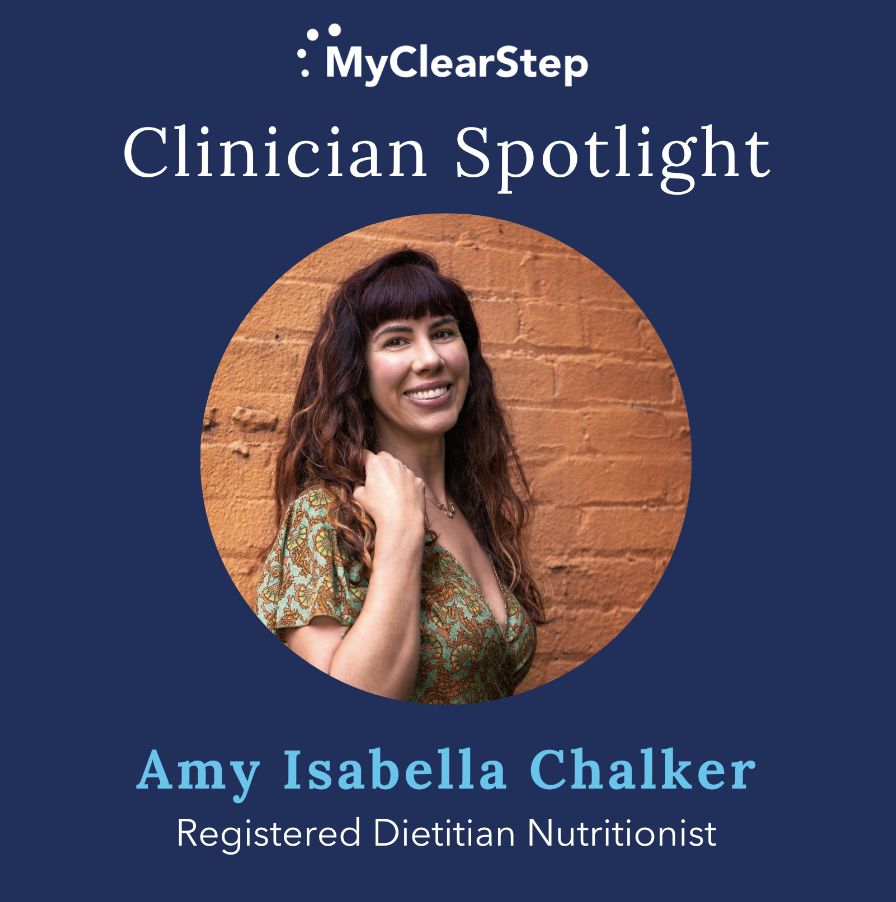

- What is your current job title? Registered Dietitian Nutritionist
- What are your current educational credentials? B.S. Nutrition and Food Science (Simmons College 2005), Dietetic Internship (California Polytechnic State University San Luis Obispo, 2006) 2-year Distance Learning Certificate Program (Center for Modern Psychoanalytic Studies, 2022)
- What inspired you to become a clinician in the field of eating disorder treatment? The eating disorder field exists at the intersection of practical day-to-day nutrition and deep psychological hopes, fears, impulses, and needs that lie below the conscious surface. As a Registered Dietitian in the field, I have the privilege of addressing both the conscious and the unconscious, helping clients to know themselves more fully as we work on their relationship to food, self, and others.
- Tell us about your journey as a clinician from your first role to your current role. While I became a Registered Dietitian Nutritionist in 2006, I did not always work directly with the eating disorder population. I began by working in private practice with individual clients and families, helping them feed their children in emotionally and behaviorally healthy ways, to improve food relationships as they age into adulthood. To that end, I developed my workshop, “Talking With Their Mouths Full”, which I have since presented dozens of times across a variety of venues and audiences. I also owned and operated a boutique artisan grocery store, highlighting the local food community and helping to showcase and grow startup food businesses beyond their local origins. In 2017, I yearned for more one-on-one client relationships and decided to recommit to my private practice by working almost exclusively with the eating disorder/disordered eating populations. I have been mentoring an eating disorder therapist and done continuing education in psychodynamic/psychoanalytic psychotherapy, and found the field to be dynamic and fulfilling; I enjoy my work very much.
- What do you currently see as the greatest barriers to eating disorder treatment and recovery? Eating disorder treatment and recovery is rarely linear, a fact that I believe needs to be embraced for treatment to be progressive and fulfilling. There must be room for messiness, curiosity, doubt, and resistance to enact real, meaningful change. I also believe eating disorder treatment often requires more time than traditional models sometimes allow; working in private practice affords the flexibility to take treatment at a pace and timeframe that works for the client, without agenda or strict programming. Flexibility tends to lead to curiosity, creativity, growth, and healing.
- What is your proudest moment as an eating disorder clinician? Whenever I collaborate with colleagues, whether in a supervision group, at a conference, in a workshop, or consultation about a mutual case, I feel proud to be a part of such a rich field that leaves room for a variety of approaches and treatment modalities. Clinicians who enter this field typically have tremendous passion for their work and compassion for their clients, and I feel fortunate to count myself a member of this population.
- What do you or your clients love most about MyClearStep? Most clients are surprised to learn that technology like MyClearStep exists! There is often a relief and an “aha moment” when they learn that MyClearStep is an option and that different ways of approaching their care exist. They enjoy the ease of taking a measurement, the privacy it affords, and the shared experience as client and clinician, even hundreds of miles apart.
- What has changed since adding MyClearStep to your practice? MyClearStep has allowed me to continue to provide comprehensive care as a clinician despite having a 100% virtual practice. When a case warrants it, I prefer the safety that regular vitals afford and appreciate that clients do not necessarily have to make a separate trip to a clinic or involve another friend or family member to take an otherwise private measurement.
- What advice would you give those considering a career in eating disorder treatment? Eating disorder treatment is anything but monolithic! If something about the field attracts you, I would recommend exploring as many treatment approaches and speaking with as many clinicians in the field as possible, to understand what appeals to you personally and professionally. I would also highly recommend ongoing supervision and psychotherapy; I believe clinicians can only go with their clients as far as they have gone themselves in their work to understand their transferences and countertransferences.
- What are some of your passions and hobbies outside of work? I enjoy an active life, making time for regular yoga and dance classes, and being outdoors as much as possible. I love to explore the culture and cuisine of new towns and cities domestically and internationally, but I also enjoy quality downtime by reading, listening to music, being with friends, and cuddling with my sweet cat.

